Overview
Data integration stands as a cornerstone for organizations, facilitating the consolidation of information from diverse sources. This process not only enhances operational efficiency but also significantly bolsters decision-making capabilities. Effective data integration is pivotal; it eliminates information silos, supports compliance, and improves data quality. Furthermore, it fosters a culture of evidence-based decision-making. Ultimately, these advantages position companies to thrive in an increasingly competitive landscape. Are you ready to transform your organization’s data strategy and harness these benefits?
Introduction
In a world where data is generated at an astonishing rate, the ability to integrate and manage this information effectively has become a cornerstone of organizational success. Data integration not only breaks down silos but also ensures that stakeholders have access to accurate and consistent data, enabling informed decision-making.
As businesses navigate the complexities of multiple systems, the demand for robust integration strategies is more pressing than ever. With projections indicating significant growth in the data integration market, organizations must prioritize their approach to harness the full potential of their data assets.
This article explores the fundamental aspects of data integration, its benefits, the challenges faced by IT managers, and real-world examples that highlight the critical role of effective integration in driving operational efficiency and compliance in today’s rapidly evolving landscape.
Understanding Data Integration: A Fundamental Overview
The unification of information is a critical process that involves merging data from various sources into a cohesive perspective. This is essential for organizations managing multiple systems and databases. Such integration not only eliminates information silos but also ensures that all stakeholders have access to reliable and accurate details. In an era where information production accelerates at an unprecedented rate, effective unification transcends mere technical necessity; it has evolved into a strategic imperative for companies striving to maintain competitiveness and adaptability in response to market fluctuations.
Today’s landscape, marked by challenges such as information security concerns and the complexities of integrating diverse data sources, underscores the significance of data integration. With the information consolidation market projected to expand significantly by 2025, organizations must prioritize robust unification strategies to fully leverage their information assets. Avato’s dedicated hybrid connectivity platform exemplifies this commitment, guaranteeing 24/7 uptime for critical connections and delivering the reliability demanded in today’s fast-paced environment.
The name ‘Avato’ derives from the Hungarian term for ‘of dedication,’ encapsulating the company’s mission to establish the technological foundation necessary for enriching, connected customer experiences. Expert insights highlight the importance of data integration, emphasizing that it not only streamlines operations but also enhances decision-making capabilities. For instance, entities employing fabric architectures—networks designed for seamless information management—are witnessing improved business insights and compliance across sectors such as banking, financial services, and healthcare.
These frameworks facilitate the unification of various information sources, illustrating the vital role of data integration in enabling comprehensive analysis and fostering a culture of evidence-based decision-making. The hybrid connection platform aligns perfectly with these requirements, offering tools that simplify complex integrations and maximize the value of legacy systems. Furthermore, the platform supports real-time monitoring and alerts regarding system performance, ensuring organizations can swiftly address any emerging issues.
The twelve stages of interface maturity provided by a vendor empower companies to balance the pace of integration with the complexity necessary to safeguard their technological frameworks.
Case studies further demonstrate the importance of data integration by showcasing the tangible benefits of efficient data merging. Firms that have successfully implemented unification projects report increased operational efficiency and reduced costs. For example, Gustavo Estrada, a client, noted that the company simplifies intricate projects, delivering results within desired timelines and budgets.
This highlights the unique contributions of the company to successful data unification initiatives, illustrating why data integration is crucial for achieving organizational objectives promptly and effectively.
As we advance further into 2025, our understanding of the importance of data integration will deepen. Organizations that invest in reliable technology stacks and connectivity processes, such as those offered by Avato, will be strategically positioned to adapt to evolving demands and maintain a competitive edge in their respective industries.
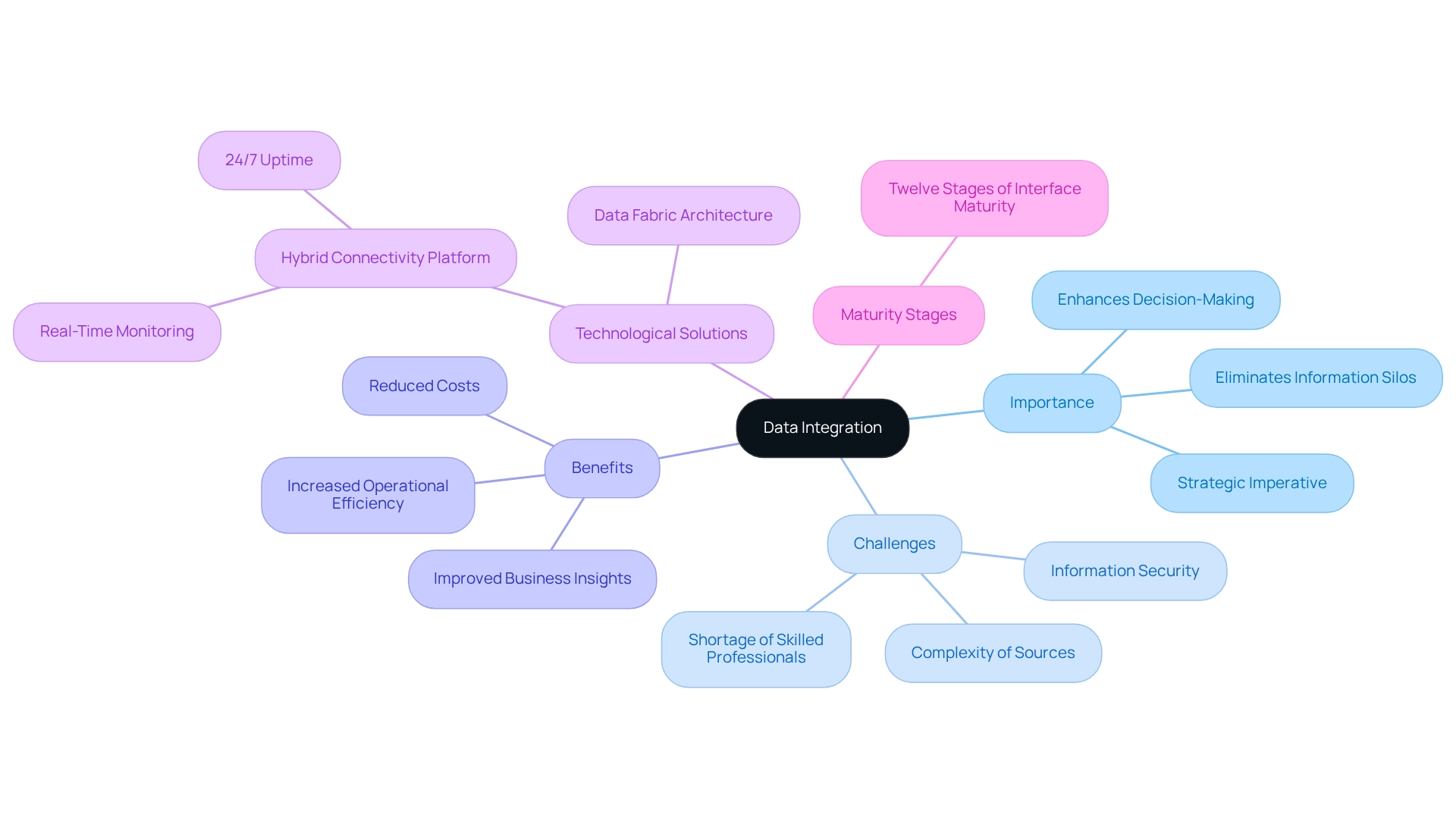
The Benefits of Data Integration: Enhancing Efficiency and Decision-Making
Understanding the significance of data integration is crucial for enhancing organizational efficiency and decision-making. By merging information from various sources, businesses can create a unified source of truth, significantly improving accuracy and minimizing the time needed for reconciliation. This streamlined access to information not only accelerates decision-making processes but also enables organizations to respond swiftly to evolving market demands.
Moreover, integrated information lays the groundwork for advanced analytics and business intelligence initiatives. As organizations increasingly rely on data-driven strategies, IT managers can leverage these insights to steer strategic initiatives and bolster operational improvements. A recent study indicates that by 2025, entities that effectively implement information unification will experience a 30% increase in decision-making speed, underscoring the importance of this capability.
The benefits of information unification clearly demonstrate why data integration is vital, transcending mere efficiency to also enhance the quality of decision-making. With accurate and timely information at their fingertips, organizations can make informed decisions that align with their strategic objectives. Indeed, companies that prioritize information unification show a 25% improvement in overall business performance, highlighting the critical role of data integration in achieving organizational success.
Practical examples further underscore these advantages. For instance, a healthcare organization that integrated its patient information systems saw a 40% reduction in administrative errors, leading to improved patient outcomes and operational efficiency. Such case studies illustrate why data integration is essential for transforming decision-making processes and enhancing organizational performance.
As we approach 2025, the landscape of information consolidation will continue to evolve, with advancements in AI and analytics making these tools more intuitive and accessible to non-technical users. Organizations may need to invest in training programs to bridge the skills gap in these areas, ensuring that their teams can fully capitalize on the benefits of integrated information. Gustavo Estrada, a client, emphasized the company’s ability to deliver results within preferred timelines and budget constraints, highlighting the practical advantages of efficient information unification.
Additionally, Tony LeBlanc from the Provincial Health Services Authority praised the company for its professionalism and expertise, further bolstering the credibility of its solutions. Ultimately, the strategic implementation of information integration, supported by Avato’s dedicated hybrid integration platform—rooted in the company’s commitment to simplifying complex integrations—will be vital for businesses striving to excel in an increasingly information-driven world.
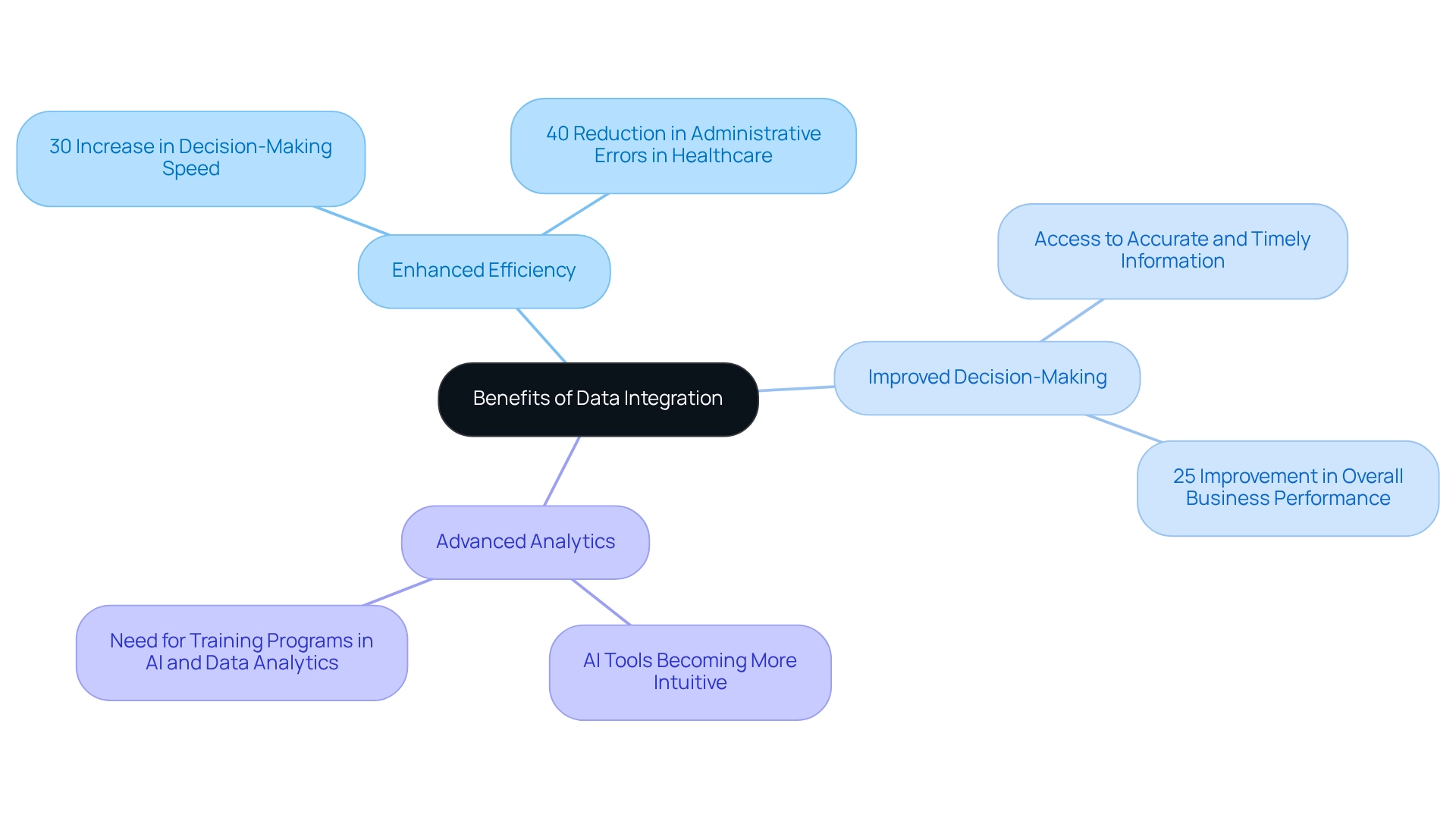
Overcoming Challenges: How Data Integration Addresses IT Manager Concerns
IT managers frequently encounter considerable challenges stemming from various information sources, including silos, inconsistent formats, and compliance issues. These obstacles can significantly impede operational efficiency and decision-making processes. In fact, a staggering 75% of organizations report difficulties in integrating insights into user experiences, with only 26% believing they provide a fully connected experience across all channels.
Furthermore, 54% of IT leaders are employing APIs to create connections, underscoring a trend towards more advanced solutions for linking systems.
Information unification emerges as a crucial solution to these challenges, illustrating the importance of data integration by facilitating seamless information flow across systems and ensuring that all details are synchronized and readily accessible. Organizations can grasp the significance of data integration by adopting robust information integration strategies that dismantle silos, foster collaboration across departments, and enforce consistent governance policies. This proactive approach highlights the critical nature of data integration, as it not only enhances operational efficiency but also mitigates risks related to regulatory compliance, particularly in sectors such as banking and healthcare where information integrity is paramount.
Utilizing technologies like XSLT can greatly simplify XML information transformation processes, reducing the effort required in executing transformative tasks. The incorporation of schemas further enhances this by identifying errors early in the development process, leading to substantial cost savings. Ignoring challenges in merging information illustrates the importance of data integration, as failure to address these challenges can result in inaccurate analysis and operational inefficiencies, ultimately leading to missed business opportunities.
A case study focusing on the risks associated with neglecting information unification emphasizes the necessity of addressing these issues to prevent decision-making errors and compliance risks. Specifically, entities that actively confront information unification challenges can significantly reduce the likelihood of compliance breaches and operational disruptions, which underscores the importance of data integration. As Gustavo Estrada, a client, remarked, “The company has simplified complex projects and delivered results within desired time frames and budget constraints.”
By overcoming information silos and leveraging Avato’s expert merging services, IT managers can markedly enhance their organizations’ responsiveness and adaptability in an increasingly information-driven environment, particularly in the banking sector where compliance and operational challenges are critical.
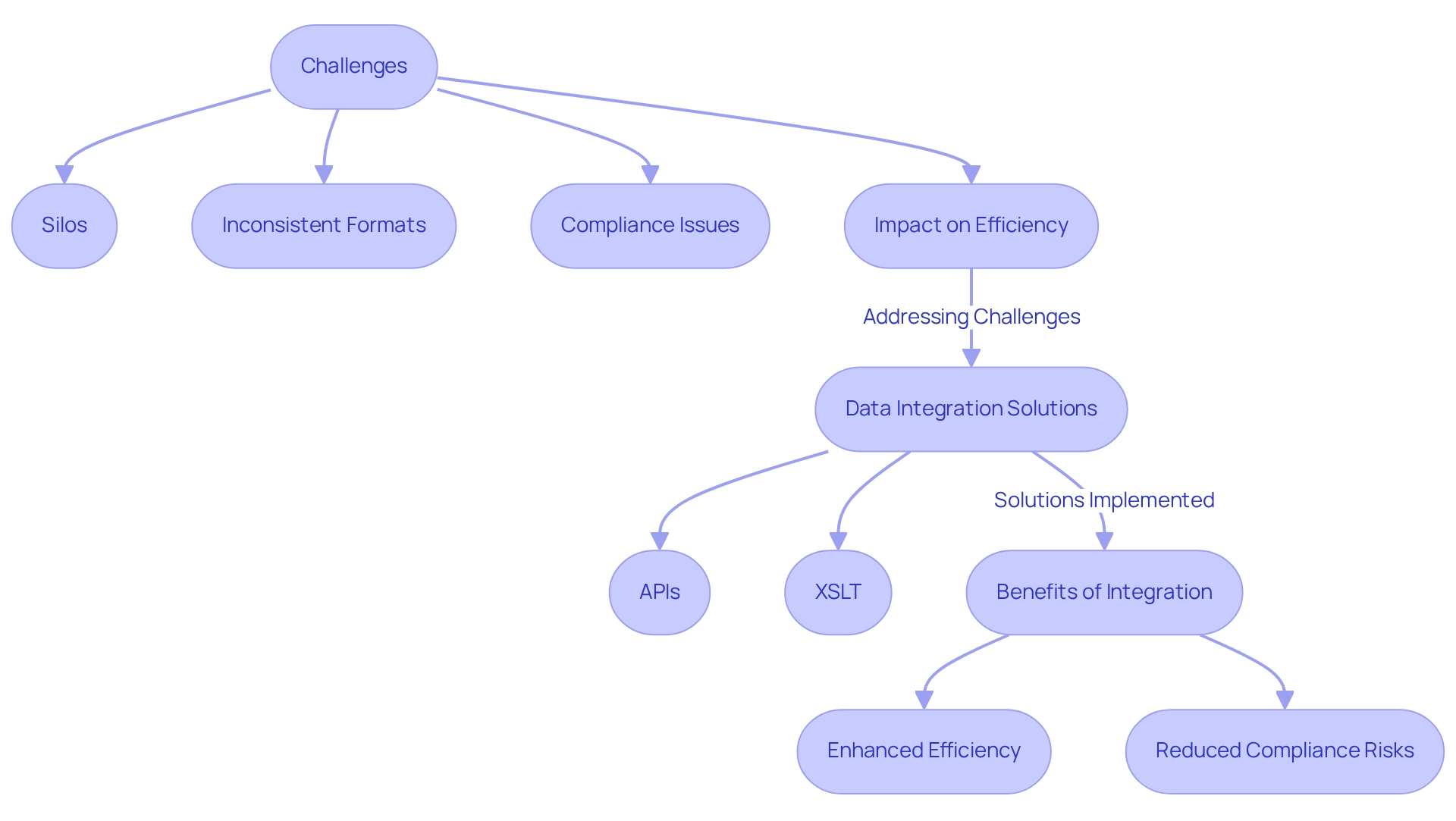
Ensuring Data Quality and Security: A Priority for IT Managers
For IT managers, ensuring information quality and security is paramount, especially in sectors that handle sensitive details. Efficient information unification procedures must utilize strict information validation and cleansing methods to maintain high standards of quality. Statistics indicate that a staggering 59% of organizations fail to assess information quality, leading to operational inefficiencies and poor decision-making. This gap underscores the importance of data integration in unification processes, serving as a fundamental component for attaining dependable results in 2025.
Avato’s Hybrid Connection Platform plays a crucial role in this landscape by maximizing and extending the value of legacy systems, simplifying complex connections, significantly reducing costs, and enhancing operational efficiency. Security measures are equally vital; implementing encryption, access controls, and performing regular audits are essential practices to protect information throughout the incorporation lifecycle. The danger of security violations in information unification procedures continues to be a significant concern, with entities encountering rising threats.
By prioritizing information quality and security, enterprises illustrate the importance of data integration, as they not only adhere to regulatory standards but also cultivate trust among clients and stakeholders, thereby improving their reputation and operational resilience.
Case studies illustrate the effectiveness of these practices. For example, the company has effectively assisted numerous organizations in enhancing their information quality and merging processes, highlighting the platform’s functionalities in practical situations. Furthermore, DVC, an open-source version control system for tracking machine learning models, emphasizes the significance of information quality by offering version control for models and datasets. This approach enhances reproducibility and collaboration, allowing teams to easily modify, revert errors, and track failures in their models in a structured manner. Organizations employing connection solutions such as Avato’s, which demonstrate the importance of data integration, have reported substantial enhancements in accuracy and reliability. Methods like automated information cleansing and real-time monitoring can significantly improve quality, ensuring that the details guiding business decisions are both precise and prompt.
Specialist views support these tactics; IT security professionals promote a thorough method to information security, stressing that no single instrument can tackle all quality concerns. As Thomas Redman aptly states, “No matter how advanced and sophisticated a machine learning model is, its effectiveness and accuracy are highly dependent on the quality of input information.” This emphasizes the importance of data integration for maintaining high information quality in unification processes.
Rather, a focused approach that includes specialized solutions such as Avato’s Hybrid Integration Platform is essential to reduce risks and improve overall information integrity. As entities navigate the intricacies of digital transformation in 2025, it will be crucial to understand the importance of data integration for the amalgamation of high-quality, secure information to achieve success.
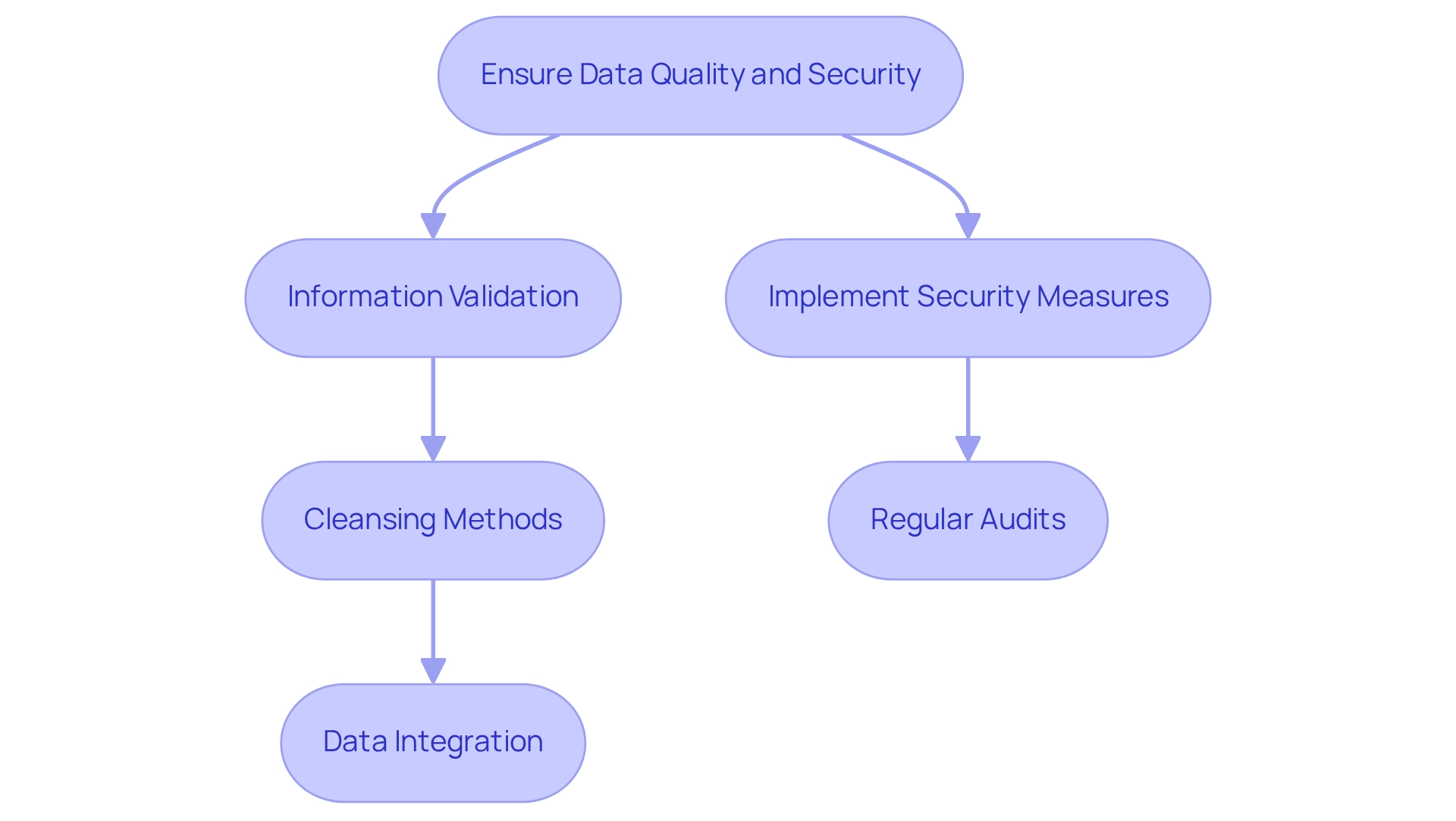
Regulatory Compliance: The Role of Data Integration in Meeting Standards
Understanding the critical importance of data integration is essential for organizations striving to meet regulatory compliance standards. By unifying information from various sources into a cohesive system, businesses can maintain precise and comprehensive records vital for compliance audits. Integrated information systems not only enhance the audit process but also underscore the significance of data integration in implementing robust governance policies.
This integration enables institutions to efficiently monitor information lineage, reinforcing the necessity of data integration in ensuring that their information management practices adhere strictly to regulatory requirements.
As we look ahead to 2024, the compliance landscape is increasingly complex. A significant 67% of executives acknowledge the challenges posed by ESG regulations, seeking more guidance from regulators. This scenario highlights the necessity for advanced technological solutions in compliance management. For instance, entities that have embraced data unification—especially through the specialized hybrid connection platform—report considerable enhancements in their compliance audit success rates, showcasing the vital role of data integration in achieving a cohesive data strategy.
Avato guarantees 24/7 uptime for critical integrations, allowing businesses to rely on integrated systems to maintain operational continuity during compliance processes.
Moreover, understanding the importance of data integration empowers integrated systems in proactive compliance management. This capability enables entities to swiftly adapt to evolving regulations. As noted by industry experts, “By adopting these tools and keeping up with emerging trends, companies can position themselves to manage the intricacies of compliance efficiently and protect their reputation, information, and operations in the years to come,” stated Sharavanan, Associate Product Marketing Manager. This proactive approach not only mitigates risks but also enhances organizational credibility and trustworthiness in the eyes of regulators and customers alike, ultimately contributing to long-term business success.
The growing trend of executives planning to increase spending on analytics and technologies that support risk detection further emphasizes the recognition of the need for advanced solutions in compliance management. Avato’s hybrid unification platform is specifically designed to tackle these challenges, equipping organizations with the necessary tools to thrive in a complex regulatory environment.
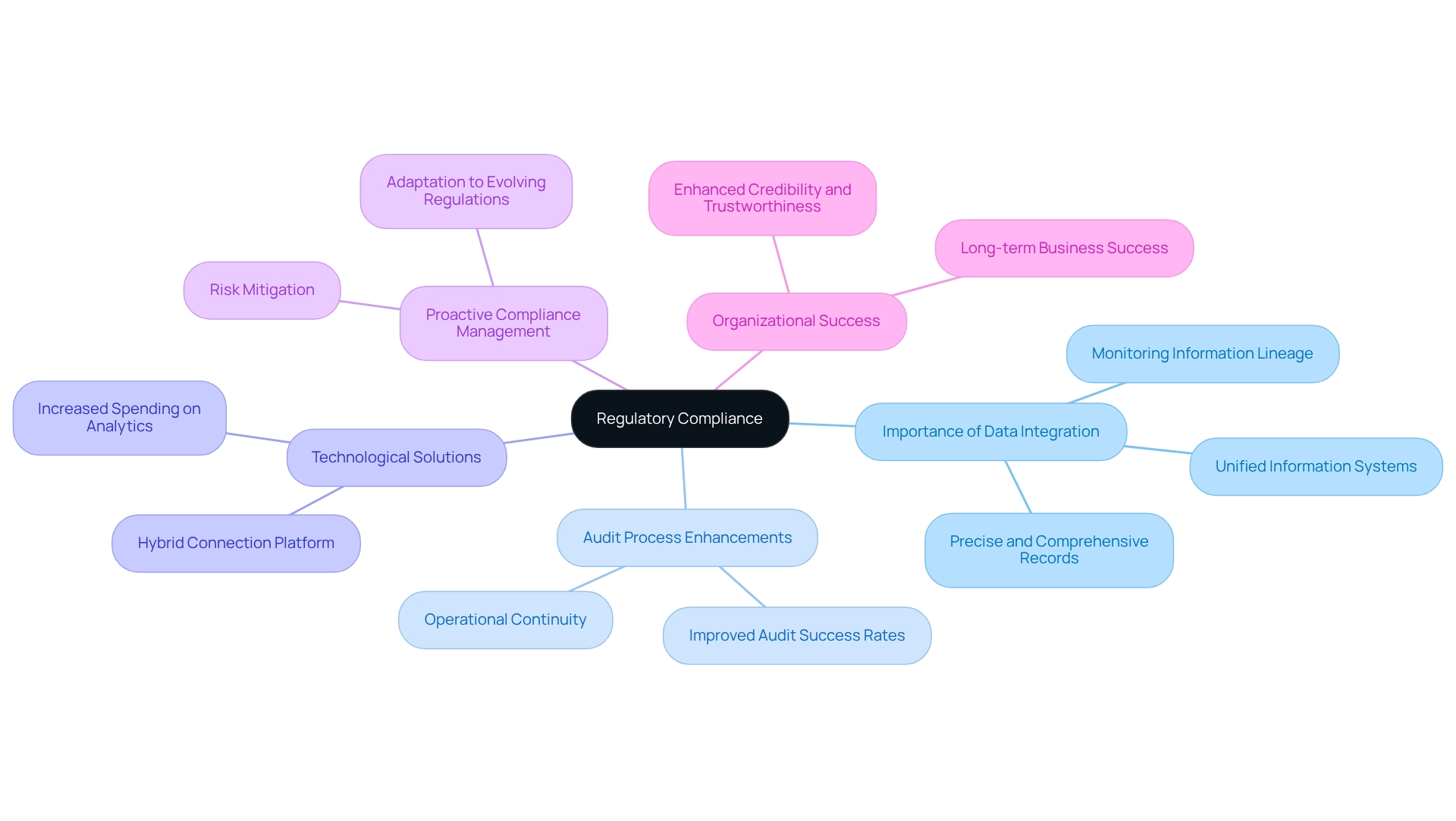
Real-World Success Stories: Data Integration in Action
Entities across various industries have harnessed the power of information unification to significantly enhance their operations and achieve strategic objectives. For instance, a leading healthcare provider successfully implemented a system that consolidated patient records from multiple platforms. This integration not only improved care coordination but also reduced administrative overhead, enabling healthcare professionals to concentrate more on patient outcomes.
In the financial sector, a company has demonstrated its expertise by deploying hybrid connection solutions that streamline operations and bolster system reliability. A notable example is Avato’s collaboration with Coast Capital, where the integration became operational in February 2013, facilitating a seamless transition of their telephone banking system in June 2016 with minimal downtime. This case highlights the speed and dependability of Avato’s solutions.
These real-world success stories underscore the critical importance of data integration by illustrating its transformative potential to drive efficiency, elevate information quality, and ultimately lead to superior business outcomes. With the global healthcare analytics industry projected to reach $75.1 billion by 2026, and pharmaceutical applications accounting for 28% of this figure, the significance of data integration for effective information unification becomes clear. Additionally, customized software solutions are revolutionizing traditional healthcare systems by automating processes from patient appointment management to data storage, ensuring compliance with the latest regulations while enhancing overall operational efficiency.
A compelling case study titled ‘Healthcare Standards Improvisation’ exemplifies this, showcasing how automation boosts efficiency and compliance in healthcare.
In the financial realm, organizations leveraging Avato’s hybrid connection platform have reported substantial improvements in operational capabilities, including cost reduction and expedited product delivery. The ability to integrate various core banking systems without necessitating modifications has paved the way for new use cases and enhanced customer satisfaction. As Gustavo Estrada remarked, ‘Avato has simplified complex projects and delivered results within desired time frames and budget constraints.’
These examples further illustrate the significance of data integration, as the unification of systems and information is not merely a technical requirement but a strategic necessity for entities striving to thrive in today’s competitive landscape. Moreover, effective healthcare applications that provide functionalities such as access to physician details and location services further exemplify the practical applications of information amalgamation in enhancing user experience and operational efficiency.
To explore how Avato can transform your organization through hybrid unification, download our comprehensive case studies and insights.
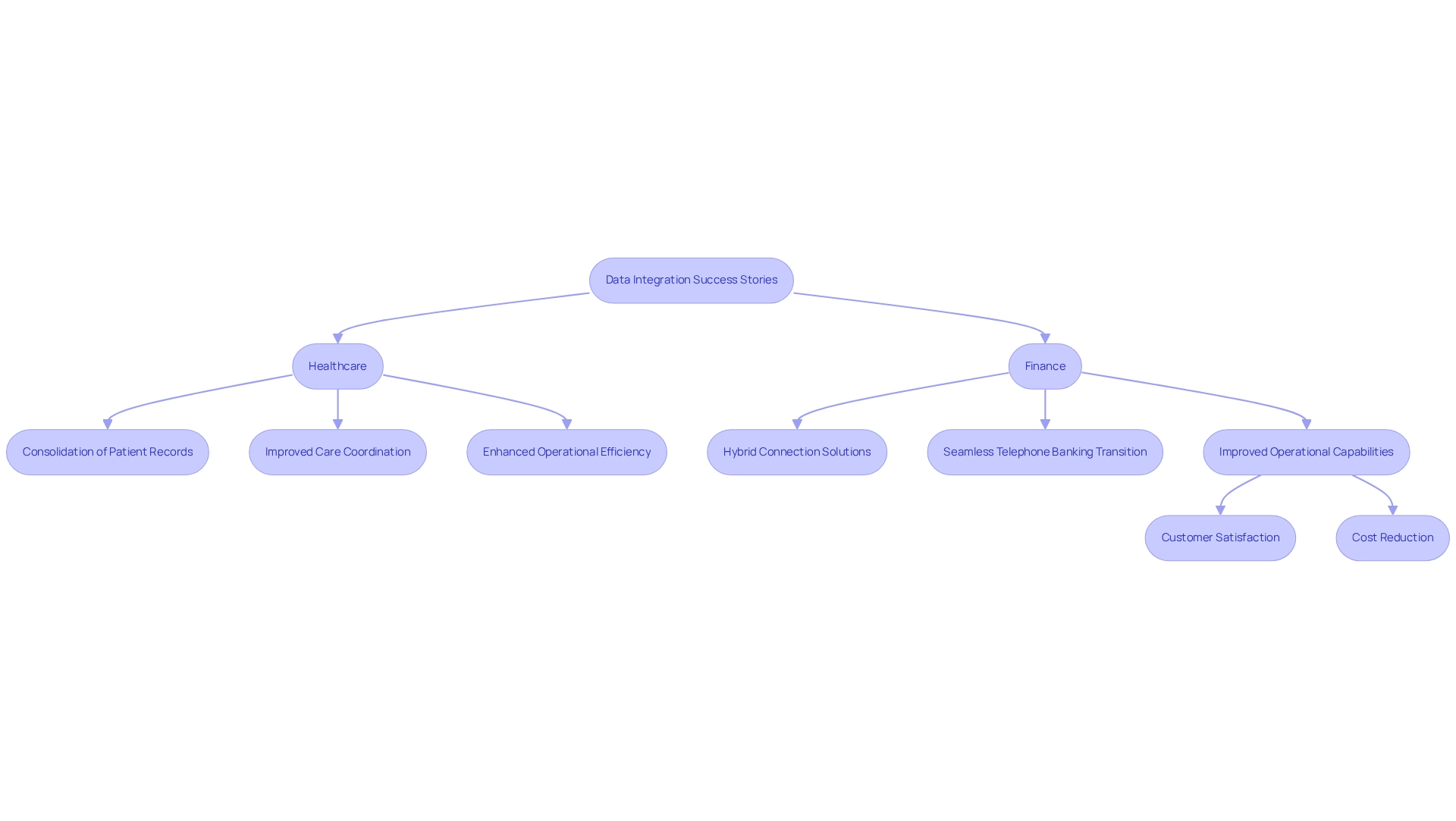
The Future of Data Integration: Trends and Innovations to Watch
The future of information unification is set to undergo significant advancements, primarily fueled by emerging technologies such as artificial intelligence (AI), machine learning (ML), and cloud computing. These innovations are not only enhancing the functionalities of information unification tools but also increasing their effectiveness and user-friendliness. For instance, the integration of AI and ML into information solutions is markedly improving processing efficiency and accuracy.
As organizations strive for swift decision-making, trends like API-based connections and real-time information processing are gaining momentum. This trend underscores the critical importance of data integration in facilitating seamless connectivity and rapid access to information.
Looking ahead to 2025, spending on information centers is projected to rise by 23.2%. This forecast emphasizes the urgent need for IT managers in the banking sector to adopt advanced unification strategies that align with these evolving trends. Understanding these developments is crucial for recognizing why data integration is essential in ensuring that information unification strategies remain competitive and in line with industry best practices. As Timothy Owens, a senior research lead in technology and telecoms, notes, “The year 2025 is set to be a crucial one for AI innovation and incorporation.”
This sentiment reflects a broader consensus among experts regarding the significance of data integration, as the unification landscape will continue to evolve, propelled by technological advancements and the increasing necessity for organizations to leverage their data effectively.
Case studies, such as those related to hybrid platforms, illustrate the tangible implications of these trends. Companies committed to streamlining complex project implementations are enabling organizations, particularly in the banking industry, to achieve their goals within desired timelines and budget constraints. By harnessing these emerging technologies, businesses can enhance their operational capabilities and reduce costs, positioning themselves for success in an increasingly data-driven environment.
Moreover, CIOs can leverage the annual Gartner Top Strategic Technology Trends to explore specific trends and align innovations with their digital objectives, further solidifying Avato’s position as a leader in the unification sector. As banks prepare for open banking, strategic integration approaches will be vital to ensure secure and reliable connections between applications, maximizing integration performance through ongoing monitoring and analytics.
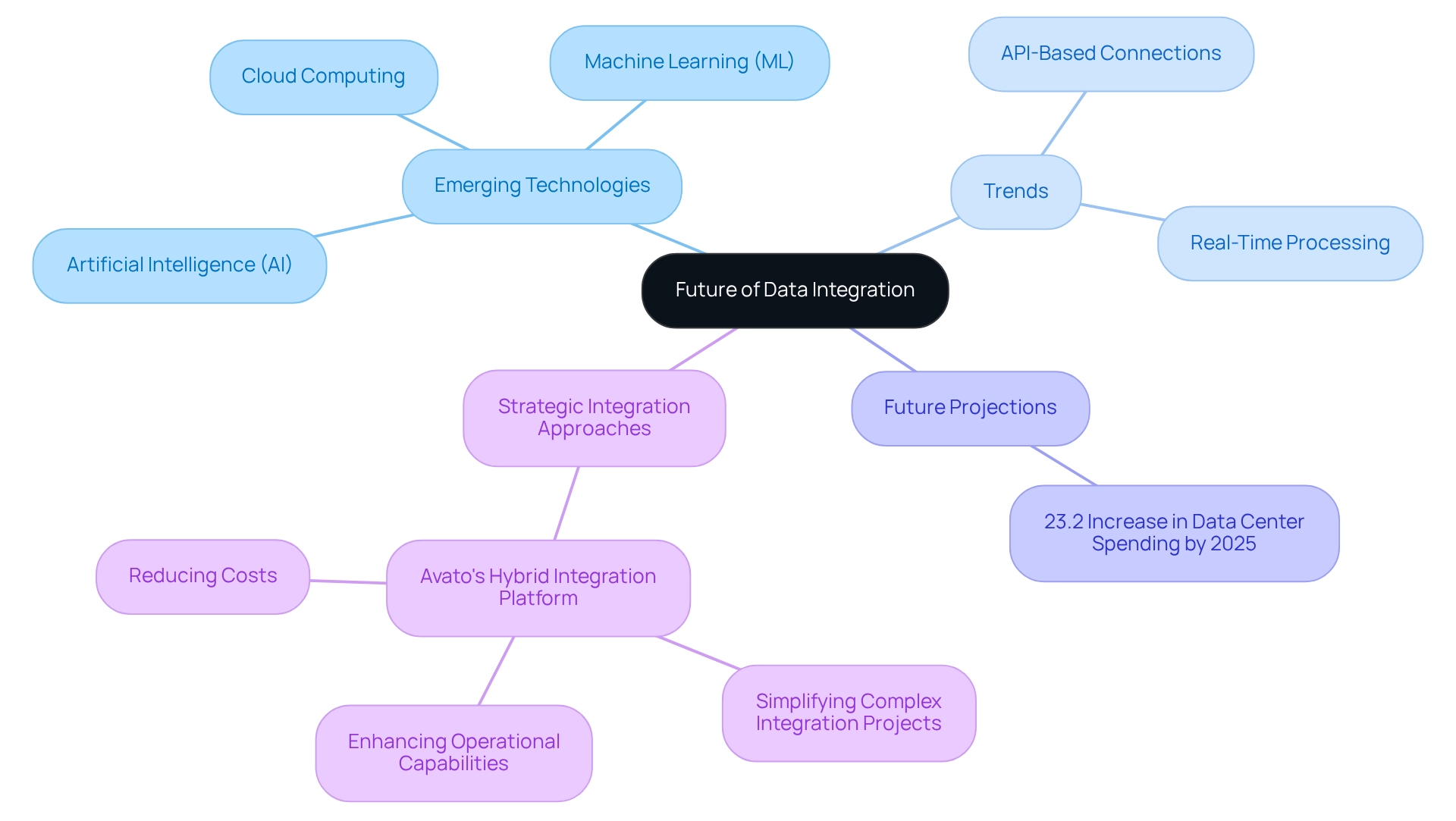
Conclusion
Data integration has become a critical element for organizational success in an increasingly data-driven landscape. By consolidating information from various sources, businesses can establish a singular source of truth that not only enhances data accuracy but also accelerates decision-making processes. As highlighted throughout this article, effective data integration streamlines operations while playing a pivotal role in meeting regulatory compliance standards, ensuring data quality, and addressing the challenges faced by IT managers.
The advantages of robust data integration strategies are evident in real-world success stories, where organizations have realized substantial improvements in operational efficiency, cost reduction, and overall business performance. As organizations gear up for a future marked by swift technological advancements, particularly in AI and machine learning, prioritizing data integration will be essential for sustaining a competitive edge.
Looking forward, the integration landscape is set to evolve, propelled by emerging technologies and the imperative for organizations to leverage their data effectively. By embracing innovative integration solutions like Avato’s hybrid platform, businesses can adeptly navigate the complexities of data management and position themselves for enduring success. In this dynamic environment, organizations that invest in data integration will not only enhance their operational capabilities but also cultivate a culture of informed decision-making, ultimately driving growth and innovation.

